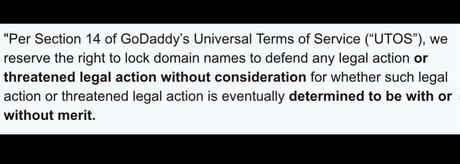
So while there is other stuff going on in domaining, for many the only thing that matters is the Brent Oxley domain lockdown at GoDaddy. Someone registered FireAman.com referring to the CEO of GoDaddy Aman Bhutani and redirected it to the thread on Namepros.
I started another thread to get the input from other domain registrars. How would they handle it?
Namecheap was approached to lock some of Oxley’s domain names and they refused.
Namecheap reply:
“Namecheap always puts our customers first, protecting their right, freedoms and valuable digital assets such as domain names. We have a proven track record of doing the right thing by our customers that includes fighting for their rights in court when deemed necessary. We do not lock or disable customer domains on a whim without the correct legal requirement.”
Moniker reply:
David Costello got a reply from Moniker where he and his brother Michael have many valuable domain names.
Hi David,
Generally speaking, it is difficult to comment on an issue where we don’t have all of the information, as well as to give a catchall answer as we do assess each case on its merit. That said, I appreciate this is an important issue and that you want to understand our stance so I’ll do my best to give you a guide.
In most circumstances we will not act on court orders regarding domain ownership for gTLDs as that is what the UDRP process was developed for and we prefer this as a mechanism for resolving disputes. We also, generally speaking, do not act on court orders from courts which do not have jurisdiction over our legal entity, which is based in the US, unless of course there was obvious and damaging criminal use of a domain using our services (e.g. Child Pornography, financial fraud, etc.) . Again, it is hard to say in all circumstances, but it is very unlikely that we would place any restrictions on a domain based on a court order from an outside jurisdiction. Registrants are actually protected from restriction of movement of a domain by ICANN rules and we are in compliance with all of the requirements of the ICANN accreditation agreement.
Please be assured that we value our customers very much and understand that for many, domain investment is how they make a living, pay their bills, put their kids through college, etc. Our support teams understand this distinction and take the time to look into the individual circumstances of every customer and domain.
I hope this helps and I apologize that I can’t be more direct.
Sincerely,
Marc McCutcheon
Head of Retail
NameSilo reply:
At NameSilo, we review these types of situations on a case by case basis. It’s difficult to comment confidently without knowing all the surrounding details, but as a US based registrar, we would request the Indian Court to work with their US counterpart and bring this civil court case there. In these types of situations, we typically work with the relevant stakeholders to understand the situation and act accordingly.
We aim to protect our customers where and when possible. However, we do also enforce legitimate court orders. Also, we would allow the registrant time to appeal their case and honor their rights to due process, as we do with UDRP cases.
Epik reply:
This one would be a pretty easy call. The registrar’s job is to protect the registrant within the bounds of the law. There was no court order. A similar principle was applied here:
https://www.epik.com/blog/why-i-stood-up-to-legitscript.html
Similar case here:
https://www.namepros.com/threads/legitscript-and-name-com-holding-domains-hostage.1141035/
If there is no court order, there is no justification to encumber or impair a domain being used within the boundaries of terms of service.
I don’t claim to know all the facts surrounding why Godaddy opted to lock Brent’s domains, or threaten to “delete” domains worth $10 million, but it surely looks peculiar.
There are times when the pressure and pain from a determined complainant can be so vigorous that it would be easier to relent. However, that is not what registrars are hired to do. We are hired to stand.
Canspace.ca a Canadian registrar – Reply:
” There is absolutely no circumstance in which we would deny clients access to their domains without a direct order from a Canadian court. “
Fabulous reply courtesy of Mike Roberts on Namepros:
As I’m sure everyone can appreciate, domain disputes are highly nuanced. The only way to evaluate these issues is on a case-by-case basis, with all the facts and information presented for a thorough review by our legal department. With that said, Fabulous.com requires official court orders from a US court to take action when it comes to locking domains.
There are, however, the possibility of extreme circumstances that may require us to lock domains in the absence of a court order. One such scenario would arise if our customer’s domains were to be hijacked; thereby, necessitating us to act swiftly by imposing a lock to secure the names. We are proud to offer this level of security and involvement for our customers.
We value our customers and have always gone above and beyond to protect their interests and their valuable domain assets.
There is a reason why Fabulous has a very loyal and dedicated customer base, consisting of a lot of original/old school domain investors. We put our customers first and will continue to do so as any emergency circumstance may arise.
Internet.BS reply:
We follow the UDRP process and generally if someone makes a claim against a domain on a gTLD we will refer them to that process. We do not act on court orders from courts outside of our jurisdiction, which is the Bahamas. If we get allegations of a domain theft, it is usually accompanied by a recent transfer, and we will lock the domain/s so that we can launch our own investigations. But this has nothing to do with the courts and is more to do with just making sure that we are protecting domain owner’s assets and livelihoods.
It is a really tricky deal for Registrars to be honest and we don’t like being in this situation as it is lose-lose. Depending on the legitimacy of the complainant, we occasionally do need to seek legal representation and defend ourselves in court because we are caught up in a claim and want to protect our customers. This is very expensive for us and we don’t get any extra money for the domain, but we spend 10s of thousands on this a year, so as to not allow a precedent. It can also block us from getting further investment in our company as financial investors will do due diligence and discover open court proceedings through this process, then raise as a risk. It sucks for us.
In the Brent Oxley situation I would guess that we would have locked the domain for a couple of weeks whilst we investigated the issue, when we found that the claimant had no legitimacy and that there was little risk to us from a legal point of view, we would have removed the locks and told the complainant to take a hike. That said, they probably wouldn’t have tried it on a company based in the Bahamas because they assume they won’t have much luck.
Best of luck to the domain owner.
Porkbun reply:
Each case is unique but based on what I’ve read regarding this particular instance, unless I’m completely missing something, we would require an actual court order from a US court with competent jurisdiction. We would never get involved in what appears to be a business or contractual dispute between two people.
The TOS line at the heart of the matter

This is what’s in GoDaddy’s TOS that is most troubling, especially the words with or without merit. It’s common legalese in TOS but domain investors are losing their minds over this point and it’s creating a lot of ill will for GoDaddy within the community.
